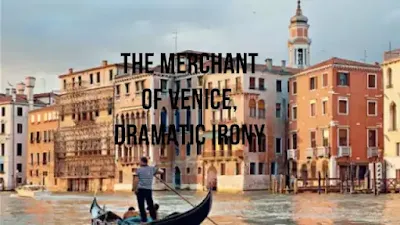Meaning and Importance of Dramatic Irony:
The device makes the drama real as it brings it nearer to life. The life is full of ironies. It also teaches the moral lesson of humility and gentleness. It is a device which a dramatist makes use in a play frequently in order to make some part of a scene or some conversation very effective. It is called dramatic because, dramatist is frequently in habit of using it. If it is used in a tragedy, it is known as "tragic irony"; if it is used in comedy, it is known as comic irony. When the turn of events contradicts the hope and expectation we have an instance of "dramatic irony" in a play. A character may boast of something but has to bite the dust is a case of dramatic irony. The fate jeers and mocks at the character and the character himself stands bewildered and confounded.

Dramatic Ironies in the Play:
The Play The Merchant of Venice abounds in the instances of dramatic ironies as the master dramatist has made an excellent use of this device to make the play artistically grand and realistic. When Shylock incorporates the words "an equal pound of flesh in his bond the dame fortune frowned on him and smiled on Antonio. Portia exploits the expression and asks Shylock to cut "an equal pound of Antonio's", neither more nor less. The words recoiled on him and throw him off balance and he never recovered. In this way, the words incorporated to ruin Antonio demolish Shylock himself. Similarly, we have innumerable instances in Trial Scene itself. When the trial seems to proceed in Shylock's favour, Shylock's joy and admiration incarnate and calls Portia Deniel etc. But all these epithets prove ironical when the trial takes the abrupt turn by Shylock's own doing Gratiano hunts them back at Shylock and the confounded Jew is overwhelmed.
Similarly the Princess of Morocco and Arragon have an overweigh estimate of their worth and virtue but their rewards are ironical. Many of their utterances are also ironical. The Prince of Morocco considers himself "a golden mind" and when he opens the golden casket he finds a "death's head"-ironical. Similarly the silver casket promises to give what the chooser deserves and the Prince of Arragon deserves a blinking idiot.
There are three main varieties of dramatic irony:
1. The Irony of Action.
2. The Verbal Irony.
3. The Prophetic Irony.
1. The Irony of Action:
A character in the play performs an action in the full belief that he is acting properly; he performs the act because he does not know certain facts which, however, are known to the audience. The audience knows that the belief of the character is mistaken. Here we have the irony of action or the irony of incident. This variety is illustrated by The Merchant of Venice.
In Act IV, scene I Bassanio sends his ring after the young lawyer who has saved the life of Antonio, because he believes that the lawyer is a male; but the audience knows that the lawyer is Portia, Bassanio's wife. This gives a pleasant frame of mind to the audience. Gratiano does an action which is similar to Bassanio's action, He gives the ring to the lawyer's clerk, thinking that the clerk is a male; but the audience knows that the clerk is Nerissa. Here we have the irony of action or incident.
2. The Verbal Irony:
A character speaks something in ignorance of certain facts which are known to the audience. This variety is also illustrated in The Merchant of Venice. In Act IV, scene I Bassanio says—
“I am married to a wife
Which is as dear to me as life itself;
But life itself, my wife, and all the world,
I would lose all, ay, sacrifice them all
............to deliver you.”
Here we have the verbal irony because he speaks these sentiments when, as he thinks, his wife is absent; but the audience knows that his wife is present because the lawyer is Portia.
Similarly in Act V, scene I, Gratiano describes the lawyer's clerk to whom he had given the ring as-
“A Kind of boy, a little scrubbed boy,
No higher than thyself..... .etc.”
Here Gratiano does not know that he is describing his wife; he does not know that the clerk was Nerissa; but the audience knows it. Here Gratiano speaks something in ignorance of certain facts which are known to the audience. Hence we have verbal irony here.



.webp)


